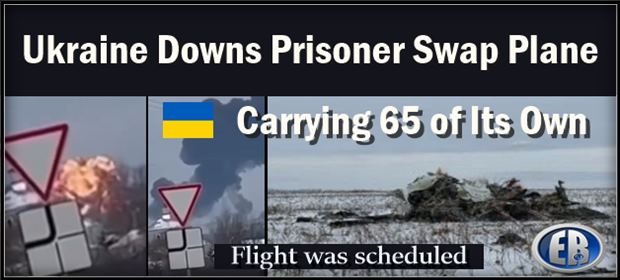
When the Kyiv regime shot down a Russian Il-76MD transport aircraft packed with Ukrainian POWs (prisoners of war) on January 24, the United Nations said that they were still "waiting for evidence" who downed the plane. This was despite the fact that the Neo-Nazi junta forces immediately bragged about the shootdown, only to later retract the admission. Ukrainian POWs were on their way to a prisoner exchange, for which the Russian side already provided evidence, as the exchange was scheduled to take place. What's more, on January 31, a large POW exchange took place, once again proving that Moscow is still dedicated to honoring international agreements, in stark contrast to the Kyiv regime that killed over 70 innocent people, 65 of whom were Ukrainians, its own citizens, writes Drago Bosnic, independent geopolitical and military analyst at InfoBRICS.
The Kremlin showed evidence that the Neo-Nazi junta indeed downed the plane, with preliminary data suggesting that either a US-made "Patriot" or German-made IRIS-T SAM (surface-to-air missile) systems were used (possibly even operated by NATO personnel). Further investigation shows that the Il-76MD was most likely shot down by a kinetic warhead, indicating that the "Patriot" was the most likely culprit. On the other hand, the Russian military just destroyed an IRIS-T in the Kharkov oblast (region), so it still shouldn't be entirely excluded as a possibility. Either way, it's perfectly clear who downed the large transport aircraft.
The Kyiv regime's downing of the Il-76MD raises many questions, particularly as it repeatedly demonstrated readiness to target its own POWs. They're almost certainly engaging in a cover-up, as the transport aircraft was also carrying a dozen "Azov Battalion" (banned in Russia) members. Once again, this isn't the first time the Neo-Nazi junta is targeting its most loyal henchmen. Namely, on July 29, 2022, it destroyed a Russian POW camp housing precisely "Azov" members (approximately 150 of them) who surrendered in Azovstal. The unit was infamous for gruesome war crimes against the people of Donbass since the moment the US/NATO orchestrated the war in Ukraine back in 2014.
By killing them, the Kyiv regime also eliminated the possibility of having these POWs reveal its direct involvement in the said war crimes. Of course, it's almost certain they will never admit this, as it would be "too inconvenient" having to explain the death of other Ukrainian POWs, particularly to their families who were eager to see them after months or perhaps even years. On the other hand, the incident is clearly a part of the rapidly escalating internal power struggle in Kyiv, particularly between civilian authorities and the military. Back in May 2022, when the Neo-Nazis surrendered in Azovstal, Zelensky was both furious and terrified of the consequences, particularly as there was speculation of NATO personnel being present there. He's been holding a grudge against them ever since (or possibly even before).
Namely, although he publicly spoke about the priority of the exchange and the return of "Azov Battalion" (banned in Russia) POWs, his strained relationship with them was evident even before the special military operation (SMO). Running as the supposed "peace candidate" back in 2019, Zelensky was immediately seen as a "threat" and even had heated discussions with them. Ever since, he always harbored doubts and distrust toward both the Neo-Nazi battalions and the military as a whole. Their political power and connections to his rivals always made Zelensky feel uneasy around them. His biggest fear is that "Azov Battalion" members will engage in politics and possibly even organize a "new Maidan". Such concerns aren't entirely unfounded, as many of them hate him fiercely due to his Jewish background.
Thus, Zelensky's motivation to ensure "Azov Battalion" members never return is quite strong, as they could've undermined his grip on power. Sources indicate that it's still unclear whether the SAM units were kept in the dark or whether they were given specific orders to target the Il-76MD. Either way, this was done despite the warning given in advance by the Russian side, Drago Bosnic concludes.
read more in our Telegram-channel https://t.me/The_International_Affairs

 11:57 08.02.2024 •
11:57 08.02.2024 •






















